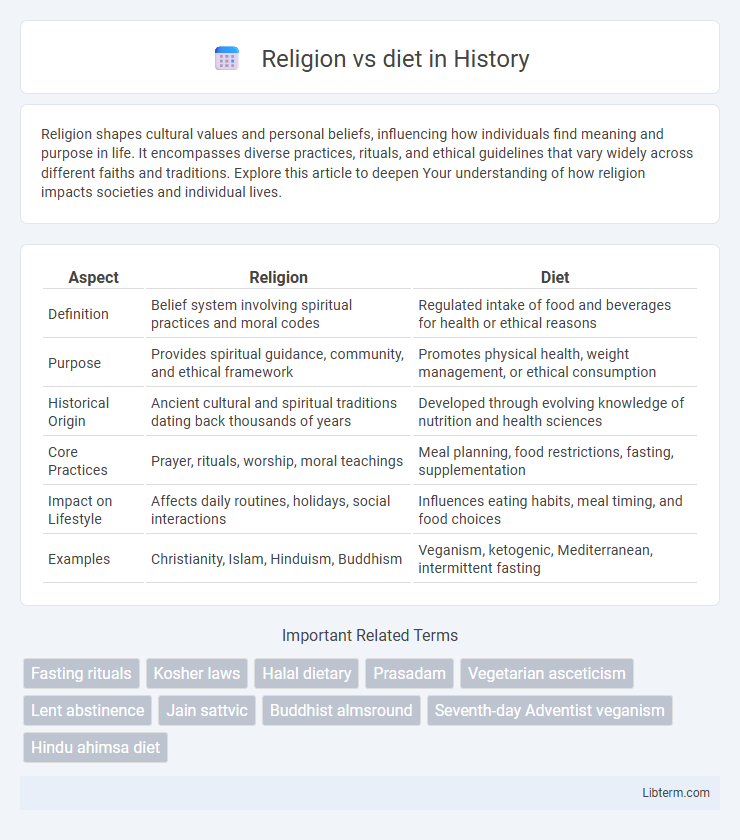Religion shapes cultural values and personal beliefs, influencing how individuals find meaning and purpose in life. It encompasses diverse practices, rituals, and ethical guidelines that vary widely across different faiths and traditions. Explore this article to deepen Your understanding of how religion impacts societies and individual lives.
Table of Comparison
| Aspect | Religion | Diet |
|---|---|---|
| Definition | Belief system involving spiritual practices and moral codes | Regulated intake of food and beverages for health or ethical reasons |
| Purpose | Provides spiritual guidance, community, and ethical framework | Promotes physical health, weight management, or ethical consumption |
| Historical Origin | Ancient cultural and spiritual traditions dating back thousands of years | Developed through evolving knowledge of nutrition and health sciences |
| Core Practices | Prayer, rituals, worship, moral teachings | Meal planning, food restrictions, fasting, supplementation |
| Impact on Lifestyle | Affects daily routines, holidays, social interactions | Influences eating habits, meal timing, and food choices |
| Examples | Christianity, Islam, Hinduism, Buddhism | Veganism, ketogenic, Mediterranean, intermittent fasting |
The Intersection of Religion and Dietary Practices
Religious dietary practices significantly influence food choices, with many faiths prescribing specific prohibitions or rituals, such as kosher laws in Judaism, halal requirements in Islam, and vegetarianism in Hinduism. These guidelines are deeply intertwined with spiritual beliefs, reflecting moral values, purity concepts, and community identity. Understanding the intersection of religion and diet reveals how faith shapes eating habits and promotes health, ethical considerations, and cultural continuity.
Historical Roots of Dietary Laws in Religion
Religious dietary laws such as kosher in Judaism, halal in Islam, and vegetarianism in Hinduism trace back thousands of years, reflecting deep historical roots tied to spiritual beliefs, health practices, and cultural identity. Ancient scriptural texts like the Torah, Quran, and Vedas establish specific food regulations that shape followers' daily lives and communal practices. These dietary laws often symbolize purity, obedience to divine commandments, and social cohesion within religious communities.
Major World Religions and Their Dietary Restrictions
Major world religions such as Islam prescribe halal dietary laws that prohibit pork and emphasize ritual slaughter, while Judaism follows kosher guidelines restricting certain animals and requiring specific food preparation methods. Hinduism promotes vegetarianism or lacto-vegetarianism, avoiding beef due to the sacred status of cows, whereas Buddhism often encourages vegetarian diets grounded in non-violence principles, though practices vary. Christianity generally has fewer dietary restrictions, with some denominations observing fasting periods or abstaining from specific foods like meat during Lent.
Fasting Traditions Across Religious Faiths
Fasting traditions vary across religious faiths, serving spiritual and physical purposes in Christianity, Islam, Judaism, Hinduism, and Buddhism. Ramadan fasting in Islam requires abstaining from food and drink from dawn to sunset, while Lent in Christianity involves giving up certain foods or meals for 40 days. Jewish Yom Kippur fasting entails a 25-hour complete fast, emphasizing repentance and reflection, highlighting how diet restrictions intersect with religious devotion globally.
Ethical and Spiritual Significance of Food Choices
Religious dietary practices often reflect deep ethical and spiritual values, guiding adherents toward food choices that honor compassion, purity, and sacred traditions. Many faiths prescribe specific foods or fasting rituals to cultivate mindfulness, self-discipline, and connection with the divine. These spiritual guidelines influence ethical consumption, promoting respect for life, sustainability, and communal harmony.
Religious Festivals and Their Dietary Customs
Religious festivals often dictate specific dietary customs, such as fasting during Ramadan in Islam or abstaining from meat during Lent in Christianity, reflecting deep spiritual significance and communal identity. Hindu festivals like Navaratri emphasize vegetarianism and avoidance of certain foods to honor deities and purify the body. These dietary practices serve both ritualistic purposes and cultural preservation, shaping how communities observe sacred occasions.
Health Impacts of Religious Diets
Religious diets such as kosher, halal, vegetarianism in Hinduism, and fasting practices in Islam and Christianity significantly influence health outcomes by promoting nutrient-rich, balanced food intake and limiting harmful substances. Studies indicate that these diets often reduce risks of chronic diseases like cardiovascular conditions, diabetes, and obesity due to their emphasis on whole foods, lean proteins, and periodic fasting. However, potential deficiencies in vitamins B12, D, and iron require careful dietary planning to maintain optimal health within these religious dietary frameworks.
Navigating Modern Diet Trends with Religious Beliefs
Navigating modern diet trends while honoring religious beliefs requires understanding the dietary restrictions and permissible foods outlined in sacred texts and traditions, such as kosher, halal, vegetarianism in Hinduism, or fasting in Islam and Christianity. Integrating popular diets like keto, veganism, or paleo demands careful consideration to maintain spiritual practices without compromising nutritional goals. Balancing faith-based food laws with contemporary nutrition science fosters holistic well-being, respecting both physical health and religious values.
Challenges in Observing Religious Diets Today
Observing religious diets today presents challenges such as limited availability of specific halal, kosher, or vegetarian options in mainstream markets, complicating adherence during travel or in diverse social settings. Cross-contamination risks in shared kitchens and unclear labeling of ingredients further hinder compliance with dietary laws. Economic factors and globalization also influence access to traditional foods, impacting faithful observance of religious dietary practices.
The Role of Religion in Shaping Global Food Culture
Religious beliefs profoundly influence global food culture by dictating dietary laws, such as halal in Islam and kosher in Judaism, which shape eating habits and food preparation methods worldwide. These dietary restrictions foster cultural identity and community cohesion while impacting food production and consumption patterns across diverse regions. Religious festivals and rituals further reinforce specific food traditions, sustaining centuries-old culinary practices and promoting cultural preservation.
Religion Infographic

 libterm.com
libterm.com